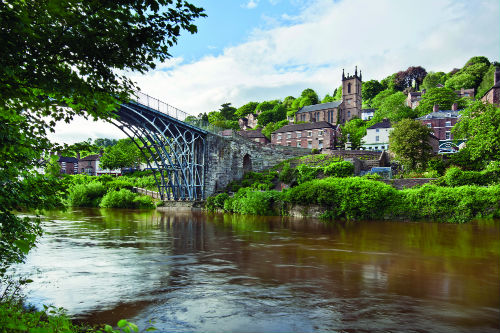Trans-Atlantic dialogues on cultural heritage began as early as the voyages of Leif Ericson and Christopher Columbus, and continue to the present day, as Professor Mike Robinson tells Ben Goodwin.
‘Once a world port for the British Empire, Liverpool has long been intimately connected with North and South America and the flows of goods and peoples’, explains Professor Mike Robinson, Director of the Ironbridge International Institute for Cultural Heritage at the University of Birmingham. ‘It therefore seemed fitting when arranging a conference exploring trans-Atlantic heritage and tourism, that it be hosted in the City of Liverpool.’
‘The conference offers a venue for exploring trans-Atlantic dialogues that consider the Old and New Worlds, as well as the flow of people, objects and ideas across the Atlantic – both North and South. Certainly, North America and Europe fashioned two dominant cultural tropes from their powerful and influential intellectual traditions, which have shaped the heritage of the other, but also those of Africa and Central and South America. These tropes are contested and linked through historical engagement and present-day connections, whilst also having a significant impact on indigenous cultures’.

Trans-Atlantic Dialogues on Cultural Heritage: Heritage, Tourism and Traditions will take place in Liverpool’s Adelphi Hotel this summer and is being presented by the Ironbridge International Institute along with the Collaborative for Cultural Heritage Management and Policy (CHAMP) at the University of Illinois. ‘CHAMP is a highly successful interdisciplinary centre focusing on Cultural Heritage, mirroring the Ironbridge Institute which has its own focus on the production, consumption and meanings of heritage sites,’ says Professor Robinson.
Although there is a strong historic element to the conference, the event will take an interdisciplinary approach to cultural heritage, encompassing such disciplines as English Literature, Anthropology, American Studies, Geography, and even Architecture. ‘We will be exploring questions such as how heritages travel, how trans-Atlantic tourism is shaped by heritage and to what extent traditions have crossed and re-crossed the Atlantic’.
More than 150 papers from 30 countries have been accepted for the conference. One of the highlights will be a panel led by Dr Helle Jørgensen, Lecturer in Cultural Heritage Studies from the Ironbridge Institute, on slavery and its heritage. ‘Dr Jørgensen is an anthropologist by education and will be incorporating her research in to the production of heritage in post-colonial contexts to explore international controversy regarding the slave trade, from the earliest days of abolitionism to current debates on racial relations. Her panel will also focus on African diaspora identities and roots tourism, commemorations of the history of slavery and demands of reparation for past atrocities,’ says Professor Robinson.
Furthermore, one of the conference’s keynote speakers will be University of Birmingham alumnus Michael Herzfeld (MA Modern Greek Studies, 1972), who is today Ernest E. Monrad Professor of the Social Sciences at Harvard University. Professor Herzfeld will be exploring how heritage can be both an ethical force and a source of violence at the same time.
The Liverpool conference epitomises the University of Birmingham’s strong research links in the US with the University of Illinois at Urbana-Champaign – a globally-elite public research-intensive university two hours’ drive from Chicago. ‘The inaugural conference in Liverpool is the climax of work so far between the Ironbridge Institute and CHAMP,’ says Professor Robinson. ‘Based on the interest this year, we hope the conference can become a biennial fixture and be hosted in key locations on both sides of the Atlantic in years to come.’
Since a Memorandum of Understanding between the Ironbridge Institute and CHAMP was signed in December 2012, collaboration between the two centres has quickly gathered pace. Alongside joint workshops, conferences and publications, there has been the development of teaching modules at masters level.
‘Both our institutions are home to rich cultural collections and museums, so it is also fitting that our collaboration includes shared museum exhibitions,’ adds Professor Robinson. ‘In fact, one of the first domestic objects of the Industrial Revolution from the Ironbridge collection – an iron cooking pot – is currently on display in the Spurlock Museum at Urbana-Champaign. The small display anticipates a major exhibition that we will co-host in the next few years at the University of Illinois.’
In addition, CHAMP’s Director, Professor Helaine Silverman, is a Visiting Research Fellow at the University of Birmingham, where she has delivered lectures and is undertaking her own research on the developments at the Ironbridge Gorge World Heritage Site. The World Heritage Site is managed by the Ironbridge Gorge Museum Trust, which formed the Ironbridge International Institute for Cultural Heritage over 30 years ago with the University of Birmingham. Both the University and the Trust share a commitment to world-leading research and innovative education, as well as creativity and engagement with the international heritage sector and the wider public.
The relationship between the Ironbridge Institute and CHAMP received a boost in March 2014 when a strategic alliance agreement between Birmingham’s Vice-Chancellor Professor David Eastwood and Illinois’ Chancellor Dr Phyllis Wise was signed at Urbana-Champaign. The BRIDGE (BiRmingham-Illinois Partnership for Discovery EnGagement and Education) alliance sets a future precedent to invest institutional resources in support of the partnership's overall expansion and sustenance.
‘Aside from Cultural Heritage, research links between the two institutions include such disciplines as Economic and Physical Geography, Railway Engineering, Biomedical Engineering, Maths, Psychology, Environmental Genomics, Sport and Exercise Sciences, American and Canadian Studies, History of Art and Education,’ says Professor Robinson. The universities are also undertaking curriculum mapping to allow significant numbers of students to engage in semester exchange programmes and will be working together to develop other innovative study abroad programmes.
Trans-Atlantic Dialogues on Cultural Heritage: Heritage, Tourism and Traditions takes place from 13-16 July.